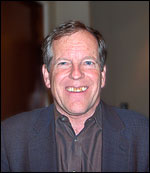Which books and magazines are tempting today’s environmental movers and shakers to keep the CFLs burning late into the night? Grist asked seven movement leaders for their recommended reads. (Been burning the night oil yourself? Add your own favorite reads in the comments section below.)
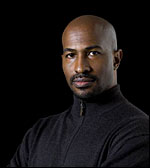
Van Jones.
Van Jones
Founding president, Green for All
Plan B 3.0: Mobilizing to Save Civilization by Lester R. Brown
Unbowed by Wangari Maathai
Building the Green Economy: Success Stories from the Grassroots by Kevin Danaher, Sharon Biggs, and Jason Mark
The Last Hours of Ancient Sunlight by Thom Hartmann
Blessed Unrest: How the Largest Social Justice Movement in History Is Restoring Grace, Justice, and Beauty to the World by Paul Hawken
Believing Cassandra: An Optimist Looks at a Pessimist’s World by Alan AtKisson
Octavia Butler’s Parable series (Parable of the Sower and Parable of the Talents)
The Making of Black Revolutionaries by James Forman
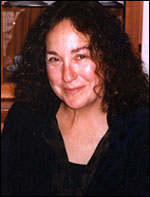
Charlotte Brody.
Charlotte Brody
Executive director, Commonweal
Somehow, I have decided that the late-night reading remedy to the Sturm und Drang of the war, the need for new ways to manage chemicals, and the presidential primary season is reading and rereading historic literature, including:
The Hummingbird’s Daughter by Luis Alberto Urrea
Labyrinth by Kate Mosse
The March: A Novel by E. L. Doctorow
Rashi’s Daughters, Book 1: Joheved by Maggie Anton
Mosse’s book, while it is the least well written, has stayed in my mind the longest, as I think about how the arc of the universe may only bend toward justice when people successfully pull in that direction.
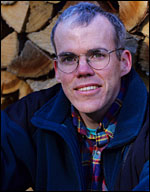
Bill McKibben.
Bill McKibben
Author, climate protection activist, teacher
World Made By Hand by James Howard Kunstler
Moyers on Democracy by Bill Moyers
The Open Road: The Global Journey of the Fourteenth Dalai Lama by Pico Iyer

Michelle Perez.
Michelle Perez
Senior Analyst, Agriculture and Natural Resources, Environmental Working Group
“The Clean Energy Scam,” by Michael Grunwald, Time Magazine. Grunwald helps explain that biofuels were a good idea initially, but their consequences were not carefully thought through.
Dirt: The Erosion of Civilizations by David Montgomery. There’s nothing like stirring historical nonfiction to reconnect people with their beginnings: dust — or, more specifically, dirt.
“Agricultural Practices in 9 States Contribute Majority of Excessive Nutrients to the Northern Gulf of Mexico,” U.S. Geological Survey, January 2008. For the first time, agricultural activities are identified as the single highest source of the nitrogen and phosphorus pollution that causes the Dead Zone in the Gulf of Mexico.
Carl Pope
Executive director, Sierra Club
Three for the millennium:
The White Dawn: An Eskimo Saga by James Houston. A book that enticed me to abandon my entire competitive, individualistic suite of values — fundamental to understanding how the rest of the world might view environmental challenges.
The Unsettling of America: Culture and Agriculture by Wendell Berry. Back in 1995, I wrote and delivered what I thought was an original speech on the failure of institutional responsibility in the modern world. Several months later, I pulled a very dusty copy of Unsettling from my book shelf, and discovered that I had stolen all my core ideas from Berry.
Steps to an Ecology of Mind: Collected Essays in Anthropology, Psychiatry, Evolution, and Epistemology by Gregory Bateson. It’s pretty clear that the only optimistic vision for this century is one in which information substitutes for material. And most of us have a very poor grounding in what information really is. Since I first read it, Steps has enabled me to pull together the data that floods my computer screen into something I can make sense of.
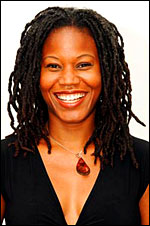
Majora Carter.
Majora Carter
Founder and executive director, Sustainable South Bronx
Where Do We Go From Here: Chaos or Community? by Martin Luther King, Jr.
The Impossible Will Take A Little While: A Citizen’s Guide to Hope in a Time of Fear edited by Paul Rogat Loeb
Open House: Of Family, Friends, Food, Piano Lessons, and the Search for a Room of My Own by Patricia Williams
And when all that gets too deep … Domino Magazine to escape
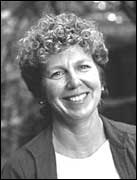
Betsy Taylor.
Betsy Taylor
President, 1Sky Campaign
Animal, Vegetable, Miracle: A Year of Food Life by Barbara Kingsolver
Deep Economy: The Wealth of Communities and the Durable Future by Bill McKibben
Bury the Chains: Prophets and Rebels in the Fight to Free an Empire’s Slaves by Adam Hochschild
Leading from Within: Poetry that Sustains the Courage to Lead by Sam Intrator and Megan Scribner
The Omnivore’s Dilemma: A Natural History of Four Meals by Michael Pollan
The Long Emergency: Surviving the End of Oil, Climate Change, and Other Converging Catastrophes of the Twenty-First Century by James Kunstler
Mountains Beyond Mountains: The Quest of Dr. Paul Farmer, a Man Who Would Cure the World by Tracy Kidder
Collapse: How Societies Choose to Fail or Succeed by Jared Diamond
Bury the Chains, Mountains Beyond Mountains, and Leading from Within are three highly inspirational books that will help social change leaders reclaim hope in the face of great adversity. Kingsolver, McKibben, Pollan, Diamond, and Kunstler write of a global economy that is destined for collapse — and each envision a new path to security, sustainability, and human fulfillment.

